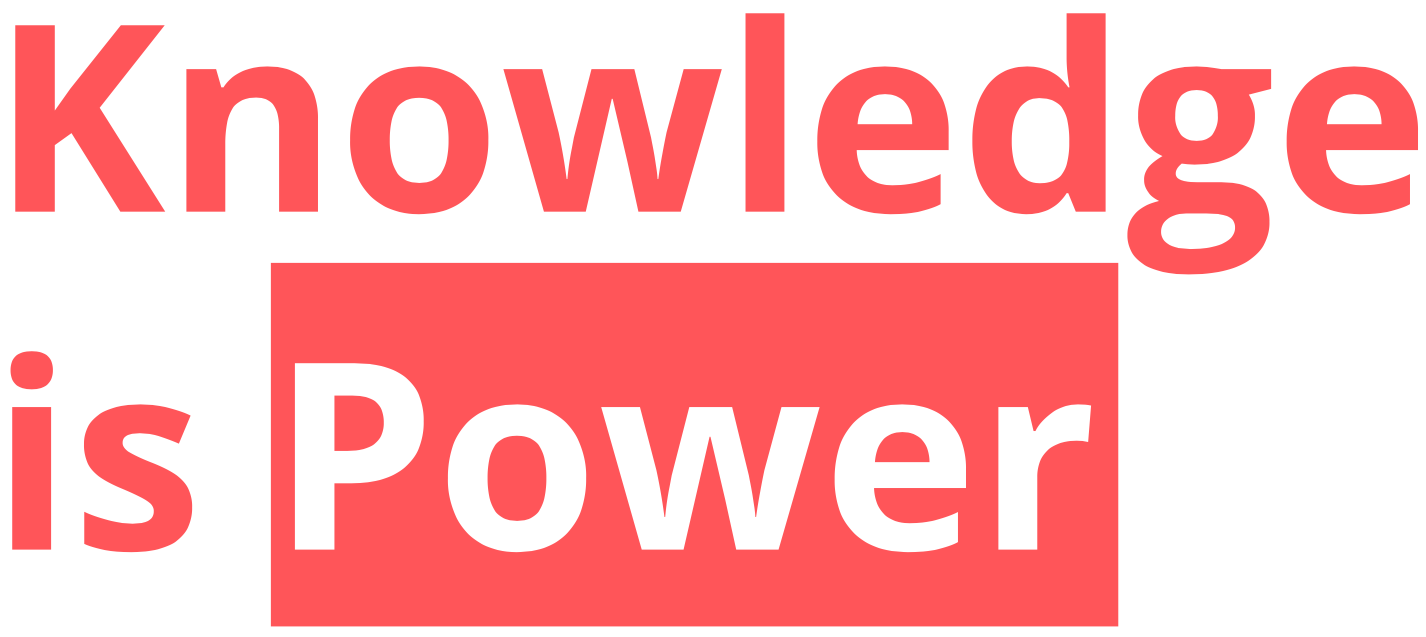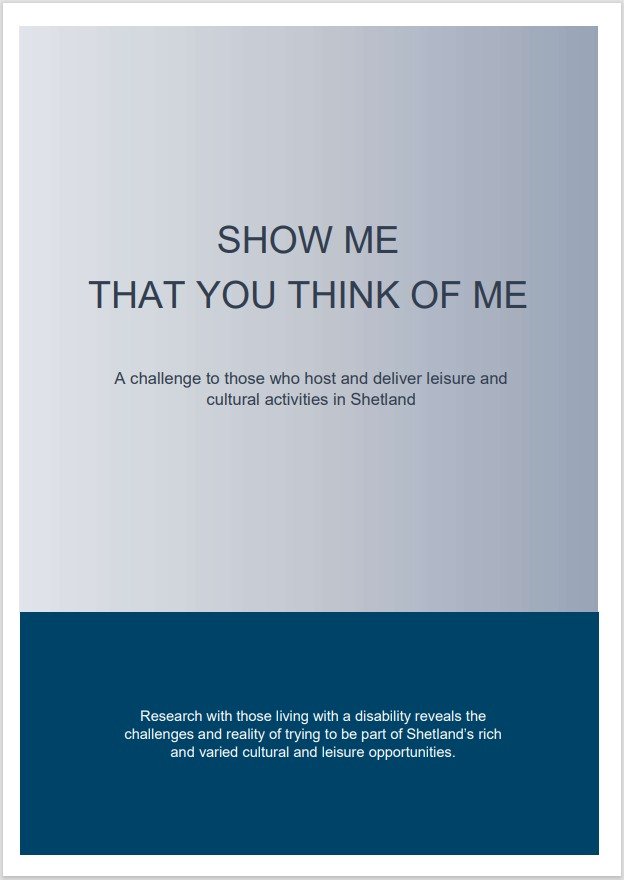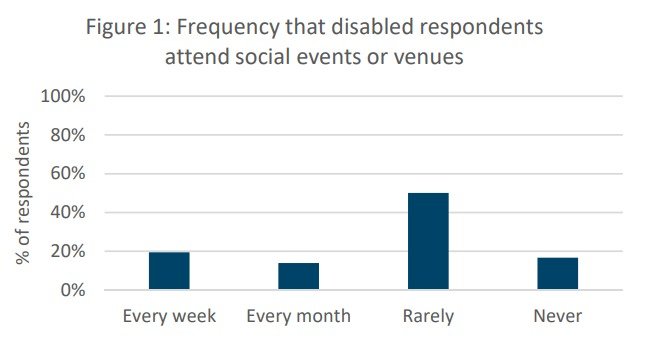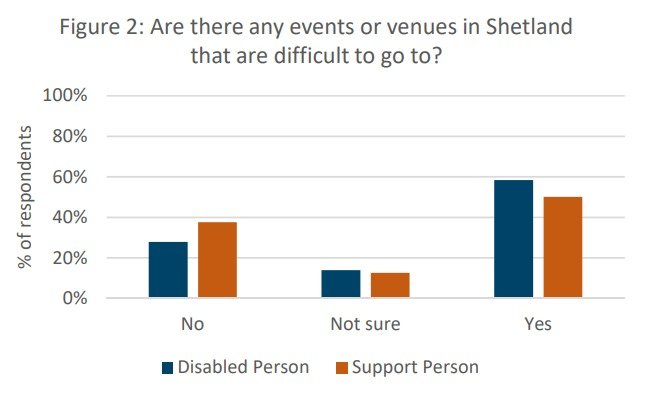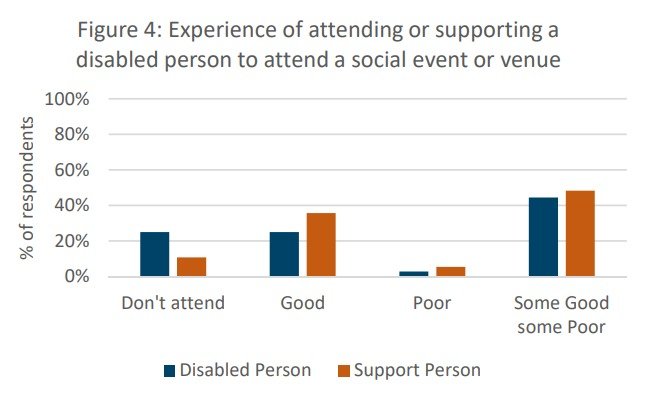Shining lights: A Knowledge is Power case study of Shetland Community Connections
/This Knowledge is Power case study of Shetland Community Connections shows how, with the right support, a determined and spirited community group can produce research that has made service providers and businesses take notice of what they need to change to make social events more inclusive.
Background
Shetland Community Connections (SCC) is a community organisation which works with individuals, organisations, schools and employers in Shetland to raise aspirations, support people to form new relationships, find work opportunities, build on their skills, and participate fully in their community.
With the support of Knowledge is Power, SCC conducted research in order to better understand the reality of attending social and cultural events or spaces for disabled people, their families and carers in Shetland and how their experiences can be improved.
To do this they produced a community survey embedded in a striking banner advert across the local online newspaper, sent to local organisations and distributed by hand. The survey had a great response, and early indications are that the research and its results are achieving the project’s aim of improving lives for disabled people in Shetland.
How the project developed
SCC supported a group of 8 community researchers to develop and carry out research into their chosen area. This group discussed issues affecting disabled people and felt that they had some common experiences around accessing events and services in Shetland. They decided to focus their Knowledge is Power project on understanding the reality of attending social and cultural events or spaces for disabled people, their families and carers in Shetland and how their experiences can be improved.
Starting with the intended impact – that Shetland social events and venues should be more inclusive for all disabled people – the group began to plan their research, including agreeing on their overall research question and thinking through methods, time, resources and ethical issues.
They developed an online survey for community members to complete, which was advertised in the local newspaper with a direct link from the online version of the newspaper.
Shetland Community Connections survey was prominently advertised in the Online version of the Local Newspaper.
To ensure everyone could take part, they ordered an easy read version which could be completed in person and then added to the online responses. The group also looked at impactful advertising and maximising the reach of the survey.
“Whenever anybody clicked onto a news item on their device, that banner was on every single news feed. So that was really interesting. The black and yellow font was one that was easily read which was important for us as well.” (Jane Haswell, Shetland Community Connections)
The majority of the research was conducted in 2021 and concluded in January 2022. The methods included:
the online survey supported by an easy read version available by post;
one-to-one consultations, the findings from which were subsequently transferred to the online survey; and
group discussions.
The consultations and group discussions were supported by Inclusion Shetland, MS Shetland (supported by MS Society and Macular Degeneration Society) and Supported Living and Outreach. The online survey was completed by, or on behalf of 96 individuals in Shetland. Of these individuals, 39% of respondents indicated they would describe themselves as a disabled person, and 61% stated they are a person who supports a disabled person to access spaces and events.
SCC then analysed the data from the survey and conversations, and produced a report (see image and link on right), the main findings of which are set out below. The report issues a simple plea on behalf of disabled people and their families and carers to those who host and deliver leisure and cultural activities in Shetland: “Show me that you think of me”.
Challenges
Research is rarely straightforward, particularly during a global pandemic. SCC’s Knowledge is Power project was the second attempt by SCC to get their project off the ground, after lockdown restrictions had made it difficult to support the initial group of interested community members.
SCC were able to put out another call for interest to take part. Eight people came forward and, with the SCC’s support, began to discuss and agree the focus of the research.
The group has also found the experience of having to conduct online meetings enabling, in the sense that a more remote spread of people are able to attend. Individual members were supported to develop their ICT skills as part of the project. The group’s Knowledge is Power mentor was able to attend more meetings than would have been possible without the virtual platform.
Findings
Findings present a mixed picture of what accessing Shetland’s venues and social events can be like for disabled people, and their friends, families, and carers. The key findings from the research are as follows:
Two-thirds of respondents who identified as a disabled person said they never or rarely attend social events or venues in Shetland (see figure 1)
More than half (58%) of disabled respondents said there are events or venues that are difficult to access (see figure 2)
· Almost half (47%) of disabled people stated that they are not confident to attend social events and venues in Shetland (see figure 3)
Three-quarters of respondents (75%) said they thought organisers and venues need to improve their planning to support disabled people to attend equally (see figure 4).
“Having someone who is challenged in their abilities to 'reality' check what is being proposed is a great idea” (quote from research)
In the group discussions, consultations, and in direct response to the survey question ‘What changes to social events or venues would have a positive impact on your attendance?’, research participants suggested ways in which event organisers and venue providers could improve disabled peoples access to and enjoyment of social events and venues. Responses fell into the following categories:
Incentives to act
Practical assistance
Advance information
Physical access to facilities
Safe spaces
Knowledge and awareness
“Confidence came up a lot. And also about 90 people who rarely or never attend. And that’s a really important message that’s evidence based. As one respondent said “ you just want to live your life and for things to work for you, and sadly they often don’t” that is a powerful message (Jane Haswell, Shetland Community Connections)
Impact
As described in SCC’s research report which they titled “Show me you think of me” it is already having a positive impact on services and venues in Shetland.
“The research has shone a light on the issues and acted as a catalyst for meaningful discussions. Since beginning the Knowledge is Power project, some services and venues in Shetland have made commitments to act on the issues raised with some having made practical improvements and a willingness to seek lived experience advice.” (From Shetland Community Connections final research report)
Shetland Community Connections now hope that further promotion of the research findings can lead to meaningful action, including:
collaborative working through the third sector forum;
the development of common methods for sharing accessibility information, including symbols; and
the promotion of organisations who can provide support to events and venues.
Furthermore, and as has been reported across many of the Knowledge is Power projects, the community researchers in Shetland gained a tremendous amount in terms of increased skills, knowledge and confidence, as can be seen in the following feedback:
“I found taking part in this research interesting & satisfying. It felt good being part of a project that I think will be genuinely useful to people.” (Community researcher)
“It enhanced both my confidence and computer skills because Jane took the time and effort to have practice sessions with me, so I could attend the TEAMS meetings, on my laptop.” (Community researcher)
“Taking part in this research has made me realise more the challenges facing disabled people and how more is needing to be done to ensure everyone can enjoy events” (Community researcher)
“I learnt so much from practical research tools to ethics to scale of work to pull it all together. Having the guidance and tools available to us and the power to research what we wanted to rather than join a project was really powerful. I will definitely look at research differently and see it more as a thing we can all do.” (Community researcher)
The following quote is from a key disability organisation in Shetland, Ability Shetland, who have let SCC know how useful the research report has been in working to make community resources in Shetland more inclusive and accessible.
We have found the “Show me that you have thought about me” research report really interesting and a great tool to open up conversations about how community resources can be more inclusive and accessible. It already has generated contact from entertainment providers to our organisation, seeking support in how they can be better at welcoming disabled people into their venues and how they ensure their activities and social opportunities are accessible and welcoming to all.
Many of those business people have commented to me that they thought they knew what they had to do to be inclusive but this report has been a real eye opener for them as that they can now identify the work still required to do to be completely inclusive to those who experience discrimination. The research project has been a great conversation starter at many meetings Ability Shetland have been part of and I have been pleasantly surprised by the amount of people who have taken notice of the report.
We can use this report as part of our funding bids to evidence the work that is still required to be done to ensure disabled people have access to activities in their own communities in Shetland and how our organisation can be part of supporting this to happen.
Having this document is really helpful as we continue to challenge attitudes and practice that is discriminatory, quoting disabled people with actual lived experience of the barriers they face in trying to have a social life in Shetland - something that many of us take for granted on a daily basis. This is a powerful piece of research that we see as a great tool for Ability Shetland.
(Ability Shetland)
Learning and reflecting
From the start, the group wanted the research to be useful in helping to improve services for disabled people. Jane said “Simply put this research would not have happened without Knowledge is Power funding and support” she feels that the impact has meant the group achieved their aim to develop robust evidence and use that to influence decisions to make improvements.
SCC used their support costs to pay for their survey to be advertised in the online version of the local newspaper, and also to pay for their report to be designed. In addition to learning plenty about advertising and maximising their social media presence, SCC made the point that the budget enabled them to do place their research on a higher footing than they would have otherwise been able to.
Another learning point concerned the support provided by Knowledge is Power, which connected the SCC with a researcher from The Poverty Alliance who provided expertise and advice around research methods, ethics, and data management.
“Laura from the Poverty Alliance was with us every step of the way. Unfortunately she never got to visit but she certainly visited us regularly online, and she really upped our skills and kept the faith and kept us going. There’s a lot of thanks from us to Laura.” (Jane Haswell, Shetland Community Connections)
Conclusion
As their report demonstrates, SCC’s Knowledge is Power project has been a remarkable success, even more so when the challenges of carrying out community research during a pandemic are factored in. On this note, it’s important to highlight, and celebrate, what the research has already done for the people with lived experience who developed and carried out the research, as well as the wider disabled community in Shetland.
“I learnt so much from practical research tools to ethics to scale of work to pull it all together. Having the guidance and tools available to us and the power to research what we wanted to rather than join a project was really powerful. I will definitely look at research differently and see it more as a thing we can all do” (Community researcher, Shetland Community Connections)
“I found taking part in this research interesting & satisfying. It felt good being part of a project that I think will be genuinely useful to people.” (Community researcher, Shetland Community Connections)
“In summary, it’s been a really positive experience which has developed our confidence to explore action research in future. This collated and analysed research needs wider distribution and that is a key aim ” (Jane Haswell, Shetland Community Connections)
Nevertheless, the group is aware that there is still a lot to be done, and that the required improvements to accessibility are in the gift of service providers and businesses.
SCC’s report sets out some proposed actions which they hope to be able to deliver in collaboration with other organisations in Shetland. These actions will take collective effort but the need is clearly laid out in the research as are the benefits for Shetland:
Launch and promote research report across Shetland media platforms.
Discuss with third sector forum the findings of report and potential for collaborative action plan.
Collect, publish, and promote a list of organisations who can support events and venues to improve their practices and facilities in support of greater inclusivity. An approach of pragmatic partnership working will be encouraged.
Explore creation of an agreed set of symbols for advertising events to provide pre-attendance information.
Link with Shetland Directory developments to incorporate accessibility information and use an events information format to provide consistency of venue and pre event advertising.
Compile a list of the many practical suggestions that respondents provided within the responses then publish and share. This will be highly valuable to make useful change.
It’s great to see SCC beginning to use their research as a catalyst for more change in Shetland.
Further information
See more Knowledge is Power case studies on our learning page.
